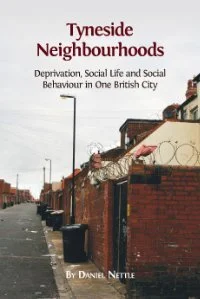By Daniel Nettle.
"Nettle’s book presents the results of five years of comparative ethnographic fieldwork in two different neighbourhoods of the same British city, Newcastle upon Tyne. The neighbourhoods are only a few kilometres apart, yet whilst one is relatively affluent, the other is amongst the most economically deprived in the UK. Tyneside Neighbourhoods uses multiple research methods to explore social relationships and social behaviour, attempting to understand whether the experience of deprivation fosters social solidarity, or undermines it. The book is distinctive in its development of novel quantitative methods for ethnography: systematic social observation, economic games, household surveys, crime statistics, and field experiments. Nettle analyses these findings in the context of the cultural, psychological and economic consequences of economic deprivation, and of the ethical difficulties of representing a deprived community. In so doing the book sheds light on one of the main issues of our time: the roles of culture and of socioeconomic factors in determining patterns of human social behaviour. Tyneside Neighbourhoods is a must read for scholars, students, individual readers, charities and government departments seeking insight into the social consequences of deprivation and inequality in the West. Nettle’s book presents the results of five years of comparative ethnographic fieldwork in two different neighbourhoods of the same British city, Newcastle upon Tyne. The neighbourhoods are only a few kilometres apart, yet whilst one is relatively affluent, the other is amongst the most economically deprived in the UK. Tyneside Neighbourhoods uses multiple research methods to explore social relationships and social behaviour, attempting to understand whether the experience of deprivation fosters social solidarity, or undermines it. The book is distinctive in its development of novel quantitative methods for ethnography: systematic social observation, economic games, household surveys, crime statistics, and field experiments. Nettle analyses these findings in the context of the cultural, psychological and economic consequences of economic deprivation, and of the ethical difficulties of representing a deprived community. In so doing the book sheds light on one of the main issues of our time: the roles of culture and of socioeconomic factors in determining patterns of human social behaviour. Tyneside Neighbourhoods is a must read for scholars, students, individual readers, charities and government departments seeking insight into the social consequences of deprivation and inequality in the West. "
Cambridge, UK: Open Book Publishers, 2015. 148p.







